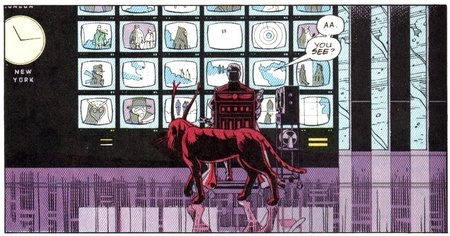Virginia Heffernan looks deep into the Twitterverse and doesn’t like everything she finds:
The “ambient awareness” that Twitter promotes — the feeling of incessant online contact — is still intact. But the emotional force of all this contact may have changed in the context of the economic collapse. Where once it was “hypnotic” and “mesmerizing” (words often used to describe Twitter) to read about a friend’s fever or a cousin’s job complaints, today the same kind of posts, and from broader and broader audiences, seem… threatening. Encroaching. Suffocating. Twitter may now be like a jampacked, polluted city where the ambient awareness we all have of one another’s bodies might seem picturesque to sociologists (who coined “ambient awareness” to describe this sense of physical proximity) but has become stifling to those in the middle of it.
I only subscribe to a handful of Twitter feeds — about twenty, almost all people I’ve met and known for years — and I protect my updates, partly to ward off feeling this way. However, I still can’t escape whiners like me:
In the old days, Facebook updaters and Twitterers mostly posted about banal stuff, like sandwiches. But that was September. It’s spring now. Look at Twistori, a new site that sorts and organizes Twitter posts that use emotionally laden words like “wish” or “hate” or “love,” thereby building an image of the collective Twitter psyche. The vibe of Twitter seems to have changed: a surprising number of people now seem to tweet about how much they want to be free from encumbrances like Twitter.
“I wish I didn’t have obligations,” someone posted not long ago. “I wish I had somewhere to go,” wrote an other. “I wish things were different.” “I wish I grew up in the ’60s.” “I wish I didn’t feel the need to write pointless things here.” “I wish I could get out of this hellhole.”
Exactly. Obviously, people use Twitter to do different things. A professor of mine has, I think, perfected it as an art of academic self-promotion — linking not just to new posts but old articles, interviews, projects, etc. But one thing that scares me about the way that I use it is that I often find myself being brutally honest about my feelings — like I’m in therapy with Wonder Woman’s lasso wrapped around my brain.
For every detached quip like “tcarmody thinks Proust would have been a great blogger. Joyce? Not so much,” there’s a strain of sentimentality (“tcarmody is watching my son play catch with my sister, who taught me how to play catch when I was a little boy”), self-pity (“tcarmody is recovering from surgery and apparently is pissing off everyone in his life. If you’re going to be useless, don’t be cranky too”), petty complaints (“tcarmody will not give up cream in his coffee. Will. Not.”), and full-blown existential dread: “tcarmody is trying and failing to call in friendships and favors. Help. I need help”; “tcarmody is deeply uncomfortable and entirely alone.”
Heffernan pulls back from this conclusion and settles for a vexed explanation based on long-felt class anxieties. I think something else is at work. Maybe it isn’t a new epoch in the history of being, but it is SOMETHING. This isn’t just ordinary moaning. Is it?



